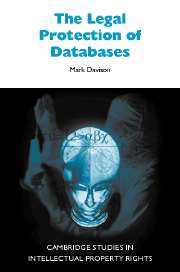Book contents
- Frontmatter
- Contents
- Foreword by William R. Cornish
- Acknowledgments
- Table of cases
- Table of legislation
- Table of European Union legislation
- Table of treaties, conventions, other international and regional instruments
- 1 Introduction
- 2 Some basic principles
- 3 Protection of databases in the EU
- 4 Transposition of the Directive
- 5 Protection of databases in the United States of America
- 6 International aspects of protection of databases
- 7 The appropriate model for the legal protection of databases
- Glossary
- Bibliography
- Index
Foreword by William R. Cornish
Published online by Cambridge University Press: 30 June 2009
- Frontmatter
- Contents
- Foreword by William R. Cornish
- Acknowledgments
- Table of cases
- Table of legislation
- Table of European Union legislation
- Table of treaties, conventions, other international and regional instruments
- 1 Introduction
- 2 Some basic principles
- 3 Protection of databases in the EU
- 4 Transposition of the Directive
- 5 Protection of databases in the United States of America
- 6 International aspects of protection of databases
- 7 The appropriate model for the legal protection of databases
- Glossary
- Bibliography
- Index
Summary
Mark Davison's book on database protection covers a vital aspect of the digital revolution. Indeed, the whole issue cries out for a place in this series. Databases stand at the juncture between information as such and the expression of literary and artistic ideas. From the first perspective, information appears to be a necessary element in social existence and so arguably it should be freely accessible to all. From the second, the need to provide an incentive for the costly business of assembling large databases argues for an equivalent appropriation to that given to creators and their producers by copyright. Deciding how to structure this crossroads – be it with filter lanes or with stop signs – calls for refined legal engineering. What has been done so far to regulate this space has in considerable degree depended on attitudes towards traffic which were formed in a horsedrawn era. Now, motorised vehicles bearing enormous loads of information bear down and have somehow to be accommodated. Hard-pressed legislators and courts have done what struck them as best, but it is far too early to say whether anything like a reasonable balance has been reached between free flow and controlled access.
It will be some time before we can see whether by and large we are offering stimulants to investment in data accumulation which are what is needed, but not evidently more than that. Mark Davison draws on the experience to date in the United States, the British Commonwealth and the European Union.
- Type
- Chapter
- Information
- The Legal Protection of Databases , pp. xvPublisher: Cambridge University PressPrint publication year: 2003



